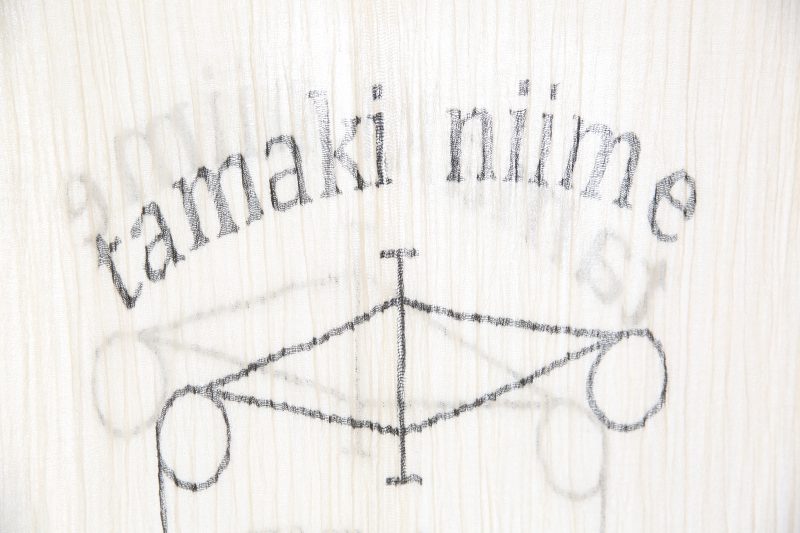niime 百科
Encyclopedia of niime
niime史 第4話
「しか」と「も」
"ONLY" and "ENOUGH"
「しか」と「も」

2019 . 04 . 15
父に勧められた住職のお話
亡くなった父がお師匠と呼んでずっと慕っていたお寺の住職さんがいて(註:臨済宗正眼寺住職・山川宗玄老師のこと)、その方がたまたま『致知chichi』という雑誌で取材を受けた記事があって、昔父に読みなさい、と言われてもらったことがあったんですけど、亡くなった時にその雑誌が急に出て来て。これは読めってことやと母がコピーしてくれて、それをもらって帰って来てたのに私ずっと読んでなくて、先日ふと目に留まって読み返してみたら、禅寺で修行している人たちって修行をして悟るわけですけど、その住職さんがどうやって悟りに至ったのかという話がそこには書いてあって。最初に父に勧められた時も読んではいたんだけど、その時は分かってるよ、くらいな感じで流してたんです。自分の中で腑に落ちてなくて。
「しか」と「も」
それが今回読んでみて、あ、そういうことかと思ったのが、その住職さんのお話によると、若い頃に軽い気持ちで入門したけど修行がしんど過ぎて、でも逃げ出したいけど逃げ出せない、じゃあどうするか?ブッ倒れればいいんだと考えたと。身体の限界を超えてパーンと倒れて、救急車で運ばれたら身体が無理なんだから仕方ないとなるから、それを目指したそうなの。
それでその日から、通常でも2時間しか眠れないくらいの睡眠時間でずぅーっと修行が繰り返されてるんだけど、その中で更に自分を追い込んだんだと。で、毎日倒れよう倒れようと思ってるんだけど、あれ?今日もまだ倒れない、という日々が続いて。結局倒れずにある夜、それまでは「1時間半しか寝られない」と思ってたのが、その時はじめてなぜか、「1時間半も寝られる」と。「ありがたい」と思ったんだって。それは多分、自分を追い込んだ結果、自分の中で開眼したということだと思うんです。
「悟る」とはシンプルなこと
同じ「1時間半寝る」ということに対して、寝られない、もっと欲しいっていう欲求と、いや1時間半も寝られるからありがたいって思うこととでは、同じことなのに、人間に与える影響って真逆らしくて。住職さんがその時初めてそう思えたこと、それが「悟り」だったんだって。
突然仏さんが目の前に現れるとか急に身体が軽くなるとか、そういうことじゃなくて、あ、なんだ、そうか!みたいな。それくらい単純なことなんですよ悟りって、というお話だったの。それを読んで、私にも昔似たようなことがあった、と思って、それを悟りっていうんだなと。悟るってもっと高次元なことなんだろうと色々読んで勉強したり瞑想とかしてるんだけど、なんかある日突然スーパーサイヤ人になるみたいな、エネルギーがブワーッと出て来るものだと思いそれを期待している自分がいたんだけど、本当に日常の些細な、こないだも話したようにかつての職場で仕事へのストレスを溜め込んでいた時に、お金を頂いてまで、それまで自分にとっては趣味だった服づくりが出来ることに対して感謝出来るかどうか、そう思えるかどうかの違いだってこと。悟るってことが、それと一緒なんだと思って。
満たされない自分を自覚する
私が過去だいたい3年ごとに移動してきたというのは、更に次のステップに行くために移転を繰り返してきたわけだけど、この地に来てまたこの3年で変わるというのは…なんていうか、せっかく自分の長年の願いが叶ったのに、満たされてなくて、何かまだ足りないと思ってる自分がいた。しょうもない、どうでもいいことだって自分に言い聞かせてるのに、でも強迫観念に追われてて。それがあかんなと思って。
だからここで3年経ってまたここから何処かへ行く可能性もあるかもしれないけど、いま此処がフルパワーか?って言われたら、ごめん、ちょっと手ぇ抜いとったと。なんか言い訳してる自分がいたってゆうか。自分が自らやり過ぎるとスタッフが育たないので放置して育てるんだと思ってた時期があったから。自分が出て行ったらあかんねん、ここはグッと堪えるとこやとか言いながら、邪魔くさいから行かないみたいな。それを言い訳にしてる自分がいたというか。スタッフにはちゃんと売り場を見なさいって説教してるのに自分は見てないみたいな。逃げてる自分がいるってゆうのをまざまざと感じて、わぁ…あかんヤツや、と思って。それに気づいて昨日の夜からお店の大掃除がスタートですよ。夜中の1時くらいまで。ヤバイ、これは日の出見ることになるな(笑)とか言いながら昨日いたスタッフたちと。掃除や整理整頓が大事やと。
空気の流れをつくる
それはそもそも「大地の再生」さんがきっかけで。空気の流れがあるところに水が流れ生き物が生きるという考え方でしょう?先日たまたま「大地の再生」の方が来てくれた時のアドバイスが、お店の中に植物を置いた方が良いんじゃないかっていうことで。でもスタッフが忙しくて面倒みてくれずに枯らしたら可哀想と私はその時答えたんだけど、ってことはお店に心の余裕がなくて良くないってことでしょう?だから、そうかその考え方があかんねや、と思って。とりあえず次の日、朝一番に窓を開けろと言って。それを決めてから私朝起きるのが楽しみになっちゃって。それまではギリギリまで起きなかったのに、朝窓を開けに行こうとする自分がいるの。2階の窓を朝全部開けまくって、あ、むっちゃ空気流れてると喜んでる自分がいる。そうしたことでお店の中の感覚的な空気も自分としては開けたんだろうね。
それできのう「断捨離」が始まって。残すものと廃番にするものとを、ずっとスタッフに決めろって任せてたのをやっぱりスタッフは決めれないじゃない、そうゆうの。外すってゆう決断ってしにくいから、ずっとズルズルしてきたのを全部キレイにして。そしたらここの棚が片付くから、ここちょっとキレイにしようと店内の整理が始まって。ディスプレイもなんなんこれ?ってブワーッとやり始めたら、気になって気になって、夜中までやっちゃった。でも、これをしてこなかったから。誰かにしてほしいと思ってたけど、自らやらなかったことがやっぱり駄目なんだなと思って。窓開けからスタートして、そうゆうことか、目の前の掃除が大切なんだってことに思いが至ったんです。
書き人越川誠司
The story of a temple master that my father recommended I read.
There was a priest of a temple, Master Sougen Yamakawa – the chief priest of the Rinzai school Shōgen-ji, that my late father considered as a teacher and was always fascinated by him. My father had once recommended that I read an article on him in the magazine, “致知 chichi” *. When my father passed away, we found the magazine by chance. We felt as if it were some spiritual message from Dad, and my Mom made a copy of the article. Even then, I hadn’t started reading it. Then one day, it caught my eye, and I launched into it. The interview was about how the temple master had reached enlightenment. I read the article when first recommended by my father, but I was like, “I know that”, and just skimmed through it. It really didn’t impress me.
“ONLY” and “ENOUGH”
When I reread it, however, there was this eureka moment. As the temple master stated what he, a young monk did when the training was too harsh but couldn’t escape from it. He thought…just fall to the ground. Once your body reaches its limit, and you fall to the ground, an ambulance will come and pick you up. Then, no one can say anything. That was how he managed his mental health when he wanted to escape when he was young. When he entered into the temple without knowing how hard the journey into becoming a monk would be.
After that day, even though the training was difficult and with only two hours of sleep a night, he pushed himself more. He said that even when he was falling to the ground by pushing himself every day, his body didn’t give up and could not fall day after day. Then, one night, he realized that he wasn’t complaining anymore that he had only one and a half an hour to sleep, but he was thankful to have one and a half hour to sleep well that night. I believe that he had a moment of clarity as a result of him pushing himself to the limit every single day.
“Enlightenment” should be a simple thing.
The unchanging fact of “one and a half an hours of sleep” can have an opposite effect depending on how they value it, whether we feel we have only a short hour to sleep and desire to rest more, or we feel thankful for being able to sleep well for one and a half an hours.
The temple master thought that was “enlightening” when he first grasped that.
It is not like Buddha suddenly appeared in front of you, nor that your body feels light as a feather or something like that. It is more like experiencing the “eureka” moment. The story about attaining “enlightenment” is that it is a simple thing. After reading it, I noticed that I had a similar experience. I guess it was the moment of enlightenment. I had assumed that it must’ve had been some higher dimension thing, and had been reading, studying and meditating. I had imagined that it must be something like suddenly turning Super Saiyan, and the feeling of acquiring a fullness of energy from out of nowhere, and I had expected those things happened after the training. However, it was just whether or not we can notice those tiny little details daily, but the thankful things. In my own case, whether or not, I can be grateful for the fact that I can make clothing, which had been just a hobby for me, and people paid for my clothing when I was stressed out at my previous workspace. I noticed that attaining enlightenment was little different from that.
Awareness of the lack of personal satisfaction.
I was moving from place to place every three years. It was because I wanted to advance myself to the next step. Working hard and moving to a new location every three years was like…probably because I was feeling the urge to change. After all, I wasn’t feeling really satisfied like something was missing. I was telling myself, they were nothing but petty things, yet I had a continuous rush of obsessive thoughts. That’s not good.
After the three years of doing business here, we could move again. But when asking myself whether I was running a business to the fullest extent, I could say I was a little careless. Maybe because I was making excuses for not doing the best I could. There was a period of time, by trying not to do too much, I decided to let our staff work and let them learn. I was telling myself that I was giving them opportunities to grow, but honestly, I was just too lazy to do the work. I guess I was probably making excuses, like telling staff to learn by watching customers at the store, but the one preaching was not doing, you know. And I realized that I was not pushing myself enough, “Oh no, I am one of those…no good…” After I came to that realization one night, I did some spring cleaning. Until 1 o’clock in the morning. Our staff and I were saying, “Oh no, we’re going to see the sunrise together (lol).” I had a feeling we needed to clean and to declutter.
Make a route for smooth airflow.
This idea is inspired by “大地の再生”, Daichi No Saisei**, a Japanese research and popularization organization that is dedicated to restoring and reconstructing damaged natural environments. Air flows, then water flows. Water flows, then living creatures can live, right? The other day, one of the members of “Daichi No Saisei” visited us and gave us a bit of advice, saying we should put plants in the store. At that time, I responded that it was a waste if our staff got busy and the plants withered away. Later, I noticed that it meant we were too busy to care for anything else, right? So, I thought we needed to quit thinking like that. The first thing the next day, I ordered our team to open the windows before we started work. After that, for some reason, I started feeling very excited to wake up in the morning. It was interesting that I started being ready to open the windows in the morning, even though waking up every morning had been a challenge for me up to that point. I opened all the windows on the second floor, and I was very satisfied to feel the air flowing so smoothly. By doing so, I guess that it enabled it to aerate the sensory atmosphere of the shop.
Then, yesterday, I began “Danshari”, a decluttering concept in three parts, “refuse”, “disposal” and “separate”. I was letting our staff decide what to continue and what to discontinue, but of course, they could not make that determination. Of course, those decisions are not an easy thing, so, finally, I got straight on it and finished the long-pushed-off task. Then, these shelves got cleaned up. So, OK, let’s do a little more cleaning here. And, I started organizing the store. I didn’t notice, and I was energized and started organizing all the displays of the store. I started seeing all the things that were not sparkling and kept cleaning all over until midnight. I think I needed to do all that because I haven’t done that before. I wished someone had done it for me, but I noticed that I needed to do it by myself. Starting with opening the windows, I came to realize that cleaning the immediate environment is most important.
Original Japanese text by Seiji Koshikawa.
English translation by Adam & Michiko Whipple.


